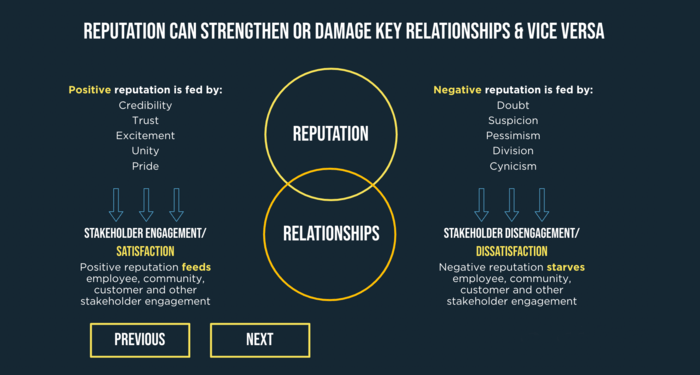The dictionary definition suggests reputation is about public perception and admiration. However, this is a very narrow view. While perception and admiration matter to reputation, leaving the understanding of reputation there can cause people within an organization to believe that “it’s just a PR thing.” This notion reduces reputation to the purview of one function in the company. It wrongly makes reputation about spin, the number and quality of press releases going out the door, inclusion in lists or likes on social channels. Worse yet, people may believe that reputation isn’t their concern at all, that it can be deprioritized, or doesn’t really need managing at all. When people in an organization excuse themselves from reputation management, they are really excusing themselves from cultivating important relationships, often without realizing they are doing damage. Decision-making degrades badly, credibility and trust recede, and reputation goes south quickly.

It’s important that people throughout your organization understand that positive reputation is all about the meaningful connections cultivated by everyone, every day in an organization’s stakeholder relationships.
Stakeholders are so much more than audiences
Audiences are generally a passive relationship – you talk, they listen. Relationships with stakeholders are mutually beneficial, two-way streets of dialogue and action. Stakeholders have influence in the form of opinion, advocacy and action that are important to you and your business. Customers buy, investors invest, and regulators regulate. Before stakeholders take these crucial actions, they go through other stages of engagement including awareness that forms an opinion and inspiration that leads to the next step before action – advocacy. Stakeholders are as they sound – people who have a stake in what you do and the relationship with you. You need them to be engaged in ways that their influence on you is positive, not negative.
Reputation and relationships are symbiotic
Reputation and relationships feed off each other. Reputation can strengthen key relationships – and vice versa. However, stakeholder relationship dynamics also can be opposing forces driving positive or negative reputation.
Positive reputation is fed by:
- Credibility
- Trust
- Excitement
- Unity
- Pride
Negative reputation is fed by the opposite dynamics:
- Doubt
- Suspicion
- Pessimism
- Division
- Cynicism
Relationships are weakened without credibility and trust. Unity can’t happen without connection points to shared values, excitement, and pride. This doesn’t mean that people in the relationships must agree on everything, but human beings need some foundation of stability in relationships. While that foundation looks different for different types of people, chaos is rarely, if ever, desirable by any definition. When words and actions in relationships are unreliable or only self-serving, one or more parties in the relationship fear the consequences and will repel or retreat.
Stakeholder relationships not only need daily care and feeding they live and die by the credibility, trust, and mutual understanding that creates meaningful and lasting bonds. When these relationship bonds are strong, reputation is not only positive, but very likely sustainable over time.
Marylou McNally is author of The Reputation Bank, an interactive planning tool and training program that is designed to help people and organizations build stronger stakeholder relationships, improve stakeholder-centric decision-making, and drive positive reputation. Learn more at thereputationbank.com.
